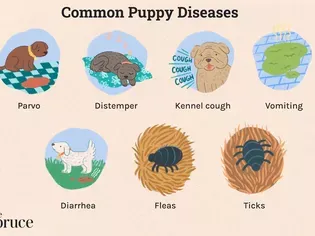7 Common Puppy Diseases You Should Know
Updated on 04/26/24

7 Common Puppy Diseases You Should Know
Bringing a new puppy home is an exciting time, but it's also important to be aware of the potential health risks that your furry friend may face. Puppies are especially susceptible to certain diseases due to their immature immune systems.
In this comprehensive guide, we'll explore the 7 most common puppy diseases, their symptoms, treatment options, and preventive measures to keep your beloved companion healthy and happy.
1. Canine Parvovirus (Parvo)
Symptoms:
- Severe vomiting
- Bloody diarrhea
- Lethargy and weakness
- Weight loss
- Dehydration
Treatment:
Parvo is a highly contagious and potentially fatal disease. Immediate veterinary care is crucial. Treatment typically involves hospitalization, intravenous fluids, antibiotics, and supportive care.
Prevention:
- Vaccination is the most effective way to prevent parvo. Puppies should receive a series of vaccinations starting at 6-8 weeks of age.
- Keep your puppy away from unvaccinated dogs and areas where unvaccinated dogs congregate.
- Practice good hygiene, such as washing your hands after handling your puppy and disinfecting any surfaces they come into contact with.
2. Canine Distemper
Symptoms:
- Respiratory symptoms (e.g., coughing, sneezing, nasal discharge)
- Eye infections (e.g., conjunctivitis)
- Gastrointestinal symptoms (e.g., vomiting, diarrhea)
- Neurological symptoms (e.g., seizures, tremors)
Treatment:
Canine distemper is a serious and often fatal disease. There is no specific cure, and treatment focuses on supportive care and managing the symptoms.
Prevention:
- Vaccination is essential for preventing canine distemper. Puppies should receive a series of vaccinations starting at 6-8 weeks of age.
- Avoid contact with unvaccinated dogs and areas where unvaccinated dogs congregate.
- Maintain a clean environment and practice good hygiene.
3. Kennel Cough
Symptoms:
- Dry, hacking cough
- Sneezing
- Nasal discharge
- Fever
- Loss of appetite
Treatment:
Kennel cough is a highly contagious respiratory infection. Treatment typically involves rest, antibiotics, and cough suppressants. In severe cases, hospitalization may be necessary.
Prevention:
- Vaccination is the best way to prevent kennel cough. Puppies should receive a series of vaccinations starting at 6-8 weeks of age.
- Avoid exposing your puppy to other dogs, especially in crowded or enclosed spaces.
- Practice good hygiene, such as washing your hands after handling your puppy and disinfecting any surfaces they come into contact with.
4. Canine Coronavirus
Symptoms:
- Mild to severe diarrhea
- Vomiting
- Lethargy
- Loss of appetite
Treatment:
Canine coronavirus is a highly contagious gastrointestinal infection. Treatment typically involves supportive care, such as providing plenty of fluids and electrolytes. In severe cases, hospitalization may be necessary.
Prevention:
- There is no specific vaccine for canine coronavirus. However, practicing good hygiene, such as washing your hands after handling your puppy and disinfecting any surfaces they come into contact with, can help reduce the risk of infection.
- Avoid exposing your puppy to other dogs, especially in crowded or enclosed spaces.
5. Canine Adenovirus
Symptoms:
- Respiratory symptoms (e.g., coughing, sneezing, nasal discharge)
- Eye infections (e.g., conjunctivitis)
- Pneumonia
- Hepatitis
Treatment:
Canine adenovirus is a serious disease that can cause a variety of health problems. Treatment typically involves supportive care and managing the symptoms. In severe cases, hospitalization may be necessary.
Prevention:
- Vaccination is the most effective way to prevent canine adenovirus. Puppies should receive a series of vaccinations starting at 6-8 weeks of age.
- Avoid contact with unvaccinated dogs and areas where unvaccinated dogs congregate.
- Practice good hygiene, such as washing your hands after handling your puppy and disinfecting any surfaces they come into contact with.
6. Giardia
Symptoms:
- Diarrhea (often with foul-smelling stools)
- Weight loss
- Dehydration
- Vomiting
- Lethargy
Treatment:
Giardia is a parasitic infection that can cause gastrointestinal problems. Treatment typically involves antiparasitic medication. In severe cases, hospitalization may be necessary.
Prevention:
- Practice good hygiene, such as washing your hands after handling your puppy and disinfecting any surfaces they come into contact with.
- Keep your puppy away from contaminated water sources.
- Avoid exposing your puppy to other dogs that may be carrying Giardia.
7. Roundworms
Symptoms:
- Diarrhea
- Vomiting
- Weight loss
- Abdominal distension
- Lethargy
Treatment:
Roundworms are intestinal parasites that can cause a variety of health problems. Treatment typically involves deworming medication. In severe cases, hospitalization may be necessary.
Prevention:
- Deworming your puppy regularly is the best way to prevent roundworms.
- Practice good hygiene, such as washing your hands after handling your puppy and disinfecting any surfaces they come into contact with.
- Keep your puppy away from contaminated soil and other areas where parasites may be present.
Conclusion
Understanding the common puppy diseases and taking preventive measures is crucial for the health and well-being of your furry friend. By recognizing the symptoms, seeking veterinary care promptly, and following recommended vaccination and hygiene practices, you can help protect your puppy from these serious illnesses. Remember, a healthy puppy is a happy puppy, and your pup's longevity and quality of life depend on your knowledge and care.
Explore More Pets

Basic Training
Puppy and Baby Introductions

Working Dog Breeds
All About Search and Rescue Dogs

Dog Treatments
Puppy Vaginitis: Signs, Causes and Treatment

Dog Adoption
After More Than 1,200 Days in the Shelter, Coco Goes Home

Basic Training
How to Train Your Puppy to Go on Potty Pads

Hybrid Dog Breeds
The Difference Between a Mutt, Mixed Breed, or Designer Dog?

Dog Treatments
Nail Problems in Dogs

Puppies
7 Reasons Why Two Dogs Are Better Than One